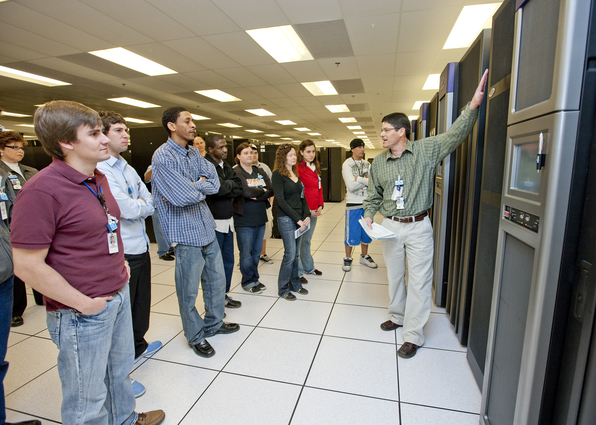Lab has strong showing at diversity conference
 (Download Image)
On tour of the Terascale Simulation Facility computer room from left: Stephen Olivier, LLNL Computation scholar; Kim Jordan, LLNL Computation AD admin; Joshua Zappia, LLNL ICS scholar; Larry Riche, Tapia Conference student; Dave Fox, Computation; Mamadou Diallo, Tapia Conference student; Jessica Semler, Tapia Conference student; Matthew Harris, ICS scholar; Vera Dadok, Tapia Conference student; Orianna, Tapia Conference visitor; John Cunningham, Computation scholar; Mark Gary of Computation, who led the tour.
(Download Image)
On tour of the Terascale Simulation Facility computer room from left: Stephen Olivier, LLNL Computation scholar; Kim Jordan, LLNL Computation AD admin; Joshua Zappia, LLNL ICS scholar; Larry Riche, Tapia Conference student; Dave Fox, Computation; Mamadou Diallo, Tapia Conference student; Jessica Semler, Tapia Conference student; Matthew Harris, ICS scholar; Vera Dadok, Tapia Conference student; Orianna, Tapia Conference visitor; John Cunningham, Computation scholar; Mark Gary of Computation, who led the tour.
With strong participation from the Laboratory, the Richard Tapia Celebration of Diversity in Computing Conference was held at San Francisco's Fairmont Hotel last week.
Tony Baylis of Computation spearheaded participation by Lab researchers and students in what has become one of the biggest conferences dedicated to attracting and supporting members of groups underrepresented in computing and information technology (IT). The conference features speakers at the forefront of their field, a technical program, student poster sessions and other opportunities to network.
"The conference offers the Lab great exposure not just for the Computation Directorate, but all the disciplines that employ computing -- from the National Ignition Facility to Engineering and infrastructure organizations such as Information and Communications Services (ICS)," said Baylis, a member of the conference organizing committee. "This is one more way the Lab can attract talent."
Attendees this year had the opportunity to tour the Lab Wednesday. The visit included tours of the Terascale Simulation Facility and the National Ignition Facility, as well as lunch and a presentation on modeling and simulation by Fred Streitz, director of LLNL's Institute for Scientific Computing Research. Tommy Smith, director of LLNL's Office of Strategic Diversity Programs, also met with the group.
Lab involvement this year was at an all-time high with more than 20 staff and students participating. Celeste Matarazzo, who leads Global Security's Supercomputing Enabled Transformational Analytics Capability (SETAC) project, served as a panelist for a discussion of "Opportunities in High Performance Computing at DOE Laboratories." Baylis also served as a panel member for a discussion of "Opportunities for Research Outside of Academia."
Other LLNL representatives who helped make the conference possible included John Knezovich of University Relations, and Kelly Crawford and Angela Amaral of Human Resources' recruiting group. LLNL student interns playing a variety supporting roles for the conference included: Beth Barnett, Stephanie Choate, Matthew Harris, John Cunningham, Sarah Barrera and Jorge Castro Morales. This is the first time the conference, which is held in a different city each meeting, has been held in the Bay Area. Founded in 2001, the biannual conference celebrated its 10th anniversary.
The conference is named for one of its principal founders, Richard Tapia, a mathematician and professor in the Department of Computational and Applied Mathematics at Rice University, and is co-sponsored by the Association of Computing Machinery, the Computing Research Association and the Institute of Electronics and Electrical Engineers' (IEEE) Computer Society. The Laboratory is a supporting organization for the conference. Tapia, who remains a guiding spirit for the conference, was a session leader this year.
More information about the conference is available on the Tapia Conference Website.




